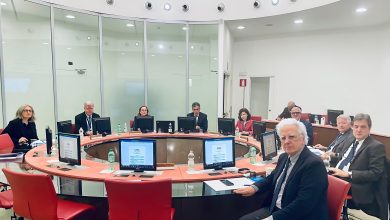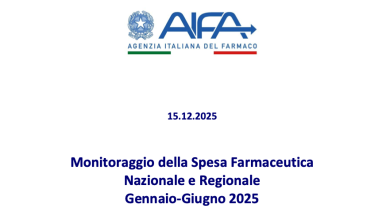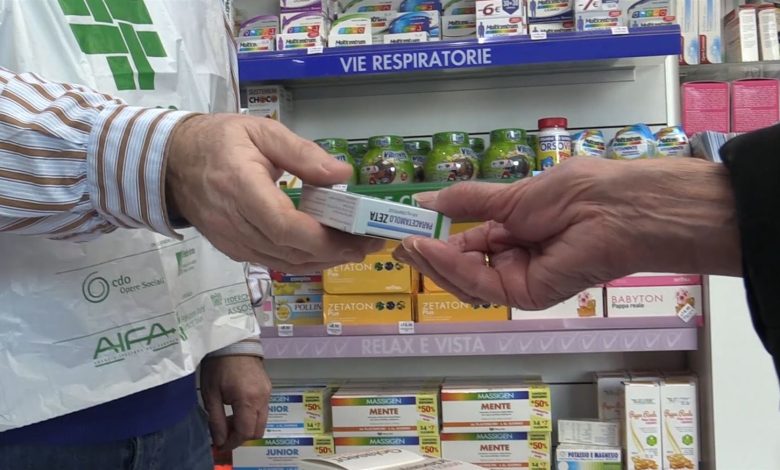
The price increase brings Italian families to their knees. A problem that now does not only affect spending 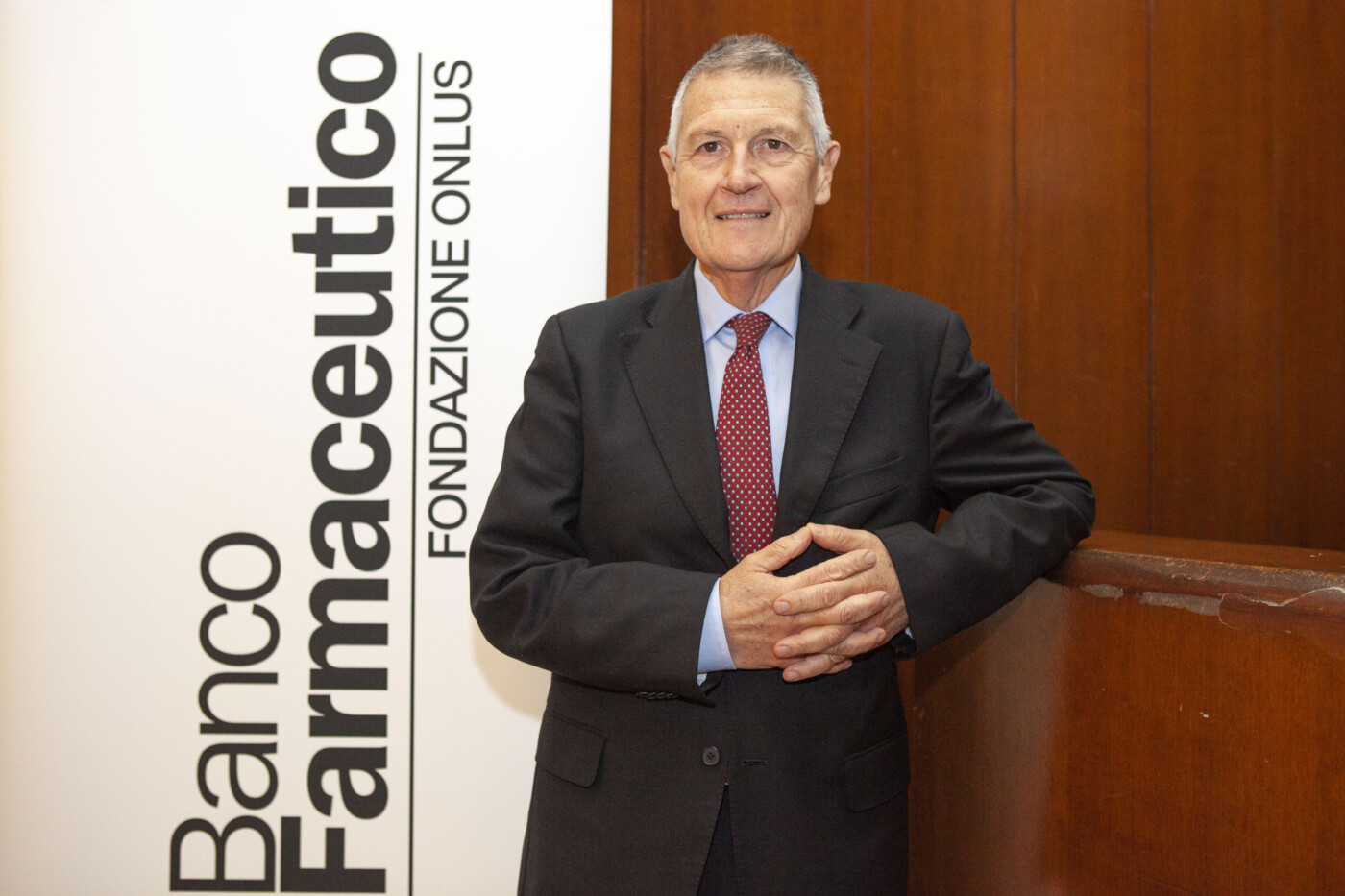 food but on other basic necessities such as medicines.
food but on other basic necessities such as medicines.
According to the president of Banco Farmaceutico Sergio Danielotti, citizens often find themselves forced to give up the purchase of necessary but not reimbursed medicines such as a painkiller or an anti-febrile.
"It's a situation that worries us a lot, if we consider that the latest data indicate that disadvantaged families have a budget for private spending of 30 euros a year," Daniotti explains to Adnkronos Salute.
“In recent weeks we have seen that the bodies that assist those in need, the structures that people turn to when they can't make it, are asking us for many drugs - antipyretic, anti-inflammatory - many more than in the same pre-winter period of the previous years,” an estimated increase of “20-30%,” he adds.
Pharmaceutical poverty is linked to the fact that some important classes of drugs, over-the-counter and without a prescription, are not loanable. “Those who need a painkiller, an antipyretic – adds the president of the Pharmaceutical Bank – must buy it. But the possibilities for spending in poor families are very scarce.”, he observes.
Daniotti says he is convinced that in this historical phase characterized by continuous emergencies "the impact will be very strong in terms of giving up treatment for many, because many families still have not realized how much everything has increased and for those who are already struggling it will be even more difficult".
Editor's note:
On La Verità of 17 October 2022 on page 10 there is an intervention/glimpse by Prof. Garattini: “Shopping 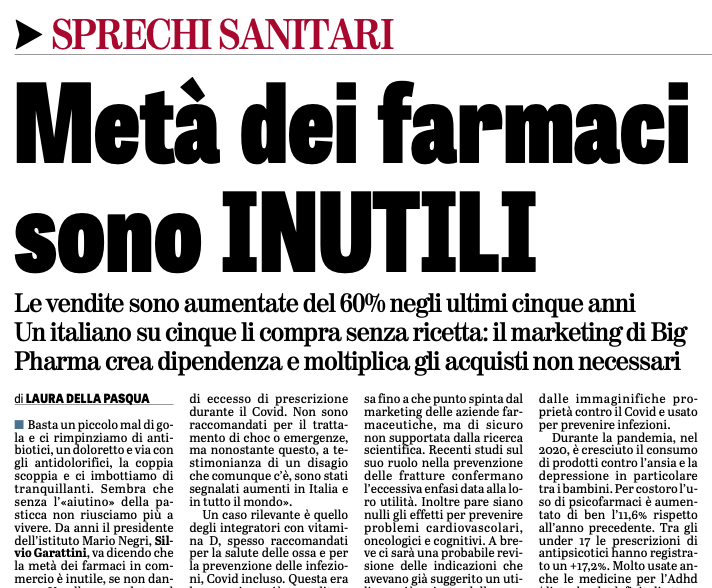 private pharmaceuticals, paid out of their own pockets by citizens, grew more than the public one and exceeded 9 billion (+6.3%). The second, which is worth a good 22.3 billion and is supported by the National Health Service, increased by 2.6% on 2020. The scenario is described in the latest Osmed Report on the use of drugs presented by AIFA, in addition 700 pages illustrating the use of medicines in our country. Over the past 15 years, drug consumption has increased by 60%. The 20% of the population takes products without a prescription. This percentage doubles in the age group between 25 and 40 years. While public spending is to be considered under control since it grows at a slower pace than that of other health items, such as personnel and hospital care, the same cannot be said of that paid by citizens, which is constantly growing in the last ten years“. All the fault, says the esteemed professor, giving space to his obsessive compulsive disorder, of the marketing of Big Pharma which creates addiction and multiplies unnecessary purchases, especially with biased information.
private pharmaceuticals, paid out of their own pockets by citizens, grew more than the public one and exceeded 9 billion (+6.3%). The second, which is worth a good 22.3 billion and is supported by the National Health Service, increased by 2.6% on 2020. The scenario is described in the latest Osmed Report on the use of drugs presented by AIFA, in addition 700 pages illustrating the use of medicines in our country. Over the past 15 years, drug consumption has increased by 60%. The 20% of the population takes products without a prescription. This percentage doubles in the age group between 25 and 40 years. While public spending is to be considered under control since it grows at a slower pace than that of other health items, such as personnel and hospital care, the same cannot be said of that paid by citizens, which is constantly growing in the last ten years“. All the fault, says the esteemed professor, giving space to his obsessive compulsive disorder, of the marketing of Big Pharma which creates addiction and multiplies unnecessary purchases, especially with biased information.
And so Dr. Daniotti is settled. If citizens take drugs at their own expense, it is their fault that they let themselves be influenced by Big Pharma.
Perhaps it would be appropriate to ask why this happens. Could it be that with methods, even punitive for doctors, the prescription of drugs is strongly opposed? And is it also extremely complicated for citizens to try to obtain a drug (direct distribution, on behalf, treatment plan, etc.)? Could it be that the consumption of vitamin D (now with great satisfaction they have put limits on why it is not prescribed) depended, as we said, on the fact that drugs for osteoporosis are "strongly discouraged"? Could it be that the population is ageing, as opinion polls show, and pathologies and drug consumption increase with age? Could it be that with the pandemic, the consumption of antipyretics and painkillers will increase? Could it be that there is an unsatisfied request for health care and the citizen manages as best he can, even at his own expense? Could it be that the NHS is universal only in words?
Among other things, Prof. Garattini has served, evidently in vain, on the board of directors of AIFA, has been a member of the board of directors of the Istituto Superiore di Sanità, vice-president of the superior council of health, president of the research and development commission of the Italian Medicines Agency (AIFA), etc. All useless!
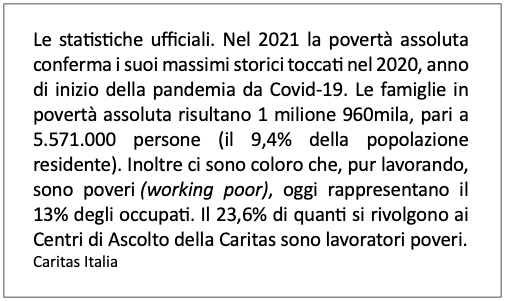 Related news: AIFA advisors on statements by Prof. Garattini
Related news: AIFA advisors on statements by Prof. Garattini
Red alert pharmaceutical spending, if the specialist doesn't cut it, he risks the Court of Auditors. Oncology patients will have 5 percent less medication.
The health system in Fvg is active, green light for employee bonuses
→ Italian Caritas. 2022 report on poverty and social exclusion in Italy ←




